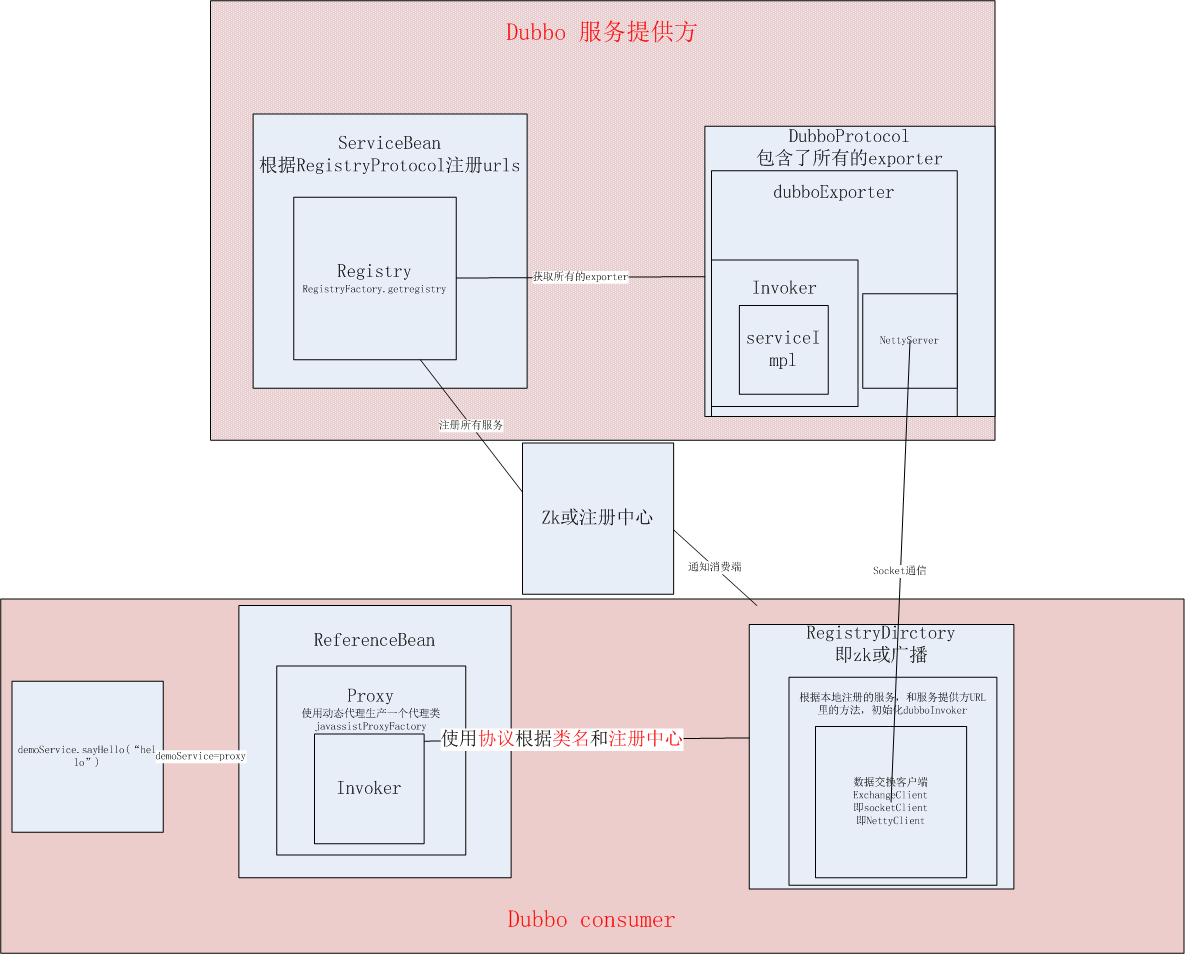dubbo 整体架构图。

1.dubbo-config-spring-2.6.2.jar 里的spring.handlers,spring.schmeas 根据自定义标签查找标签处理类
http\://dubbo.apache.org/schema/dubbo=com.alibaba.dubbo.config.spring.schema.DubboNamespaceHandler
http\://code.alibabatech.com/schema/dubbo=com.alibaba.dubbo.config.spring.schema.DubboNamespaceHandler
2.初始化名字
3.dubbo中的代理 使用Javassis 生产的动态代理
@Override public <T> Invoker<T> getInvoker(T proxy, Class<T> type, URL url) { // TODO Wrapper cannot handle this scenario correctly: the classname contains '$' final Wrapper wrapper = Wrapper.getWrapper(proxy.getClass().getName().indexOf('$') < 0 ? proxy.getClass() : type); return new AbstractProxyInvoker<T>(proxy, type, url) { @Override protected Object doInvoke(T proxy, String methodName, Class<?>[] parameterTypes, Object[] arguments) throws Throwable { return wrapper.invokeMethod(proxy, methodName, parameterTypes, arguments); } }; }
invoker调用invoke 。
@Override public Result invoke(Invocation invocation) throws RpcException { try { return new RpcResult(doInvoke(proxy, invocation.getMethodName(), invocation.getParameterTypes(), invocation.getArguments())); } catch (InvocationTargetException e) { return new RpcResult(e.getTargetException()); } catch (Throwable e) { throw new RpcException("Failed to invoke remote proxy method " + invocation.getMethodName() + " to " + getUrl() + ", cause: " + e.getMessage(), e); } }
4.URL里的service-key 为接口名: com.alibaba.dubbo.demo.DemoService
一.名词介绍
1.invocation 被调用的对象,在服务的消费方,根据调用的对象和方法,组装成一个被调用的对象。
2.Invoker 调用对象,用户提供服务方,
public interface Invoker<T> extends Node { /** * get service interface. * * @return service interface. */ Class<T> getInterface(); /** * invoke. * * @param invocation * @return result * @throws RpcException */ Result invoke(Invocation invocation) throws RpcException; }
3.Exporter 获取调用者,摧毁调用者。
public interface Exporter<T> { /** * get invoker. * * @return invoker */ Invoker<T> getInvoker(); /** * unexport. * <p> * <code> * getInvoker().destroy(); * </code> */ void unexport(); }
4.DubboProtocol 1.创建 dubboExporter, 2.开启dubbo socketserver.
@Override public <T> Exporter<T> export(Invoker<T> invoker) throws RpcException { URL url = invoker.getUrl(); // export service. String key = serviceKey(url);
//创建 dubboExporter DubboExporter<T> exporter = new DubboExporter<T>(invoker, key, exporterMap); exporterMap.put(key, exporter); //export an stub service for dispatching event Boolean isStubSupportEvent = url.getParameter(Constants.STUB_EVENT_KEY, Constants.DEFAULT_STUB_EVENT); Boolean isCallbackservice = url.getParameter(Constants.IS_CALLBACK_SERVICE, false); if (isStubSupportEvent && !isCallbackservice) { String stubServiceMethods = url.getParameter(Constants.STUB_EVENT_METHODS_KEY); if (stubServiceMethods == null || stubServiceMethods.length() == 0) { if (logger.isWarnEnabled()) { logger.warn(new IllegalStateException("consumer [" + url.getParameter(Constants.INTERFACE_KEY) + "], has set stubproxy support event ,but no stub methods founded.")); } } else { stubServiceMethodsMap.put(url.getServiceKey(), stubServiceMethods); } } //打开socketserver openServer(url); optimizeSerialization(url); return exporter; }
5.HeaderExchangeServer 心跳server,定时在socket建立的channel 上发送信息。
private void startHeartbeatTimer() { stopHeartbeatTimer(); if (heartbeat > 0) { heartbeatTimer = scheduled.scheduleWithFixedDelay( new HeartBeatTask(new HeartBeatTask.ChannelProvider() { @Override public Collection<Channel> getChannels() { return Collections.unmodifiableCollection( HeaderExchangeServer.this.getChannels()); } }, heartbeat, heartbeatTimeout), heartbeat, heartbeat, TimeUnit.MILLISECONDS); } }
6.NettyServer 开启socket server
@Override protected void doOpen() throws Throwable { NettyHelper.setNettyLoggerFactory(); ExecutorService boss = Executors.newCachedThreadPool(new NamedThreadFactory("NettyServerBoss", true)); ExecutorService worker = Executors.newCachedThreadPool(new NamedThreadFactory("NettyServerWorker", true)); ChannelFactory channelFactory = new NioServerSocketChannelFactory(boss, worker, getUrl().getPositiveParameter(Constants.IO_THREADS_KEY, Constants.DEFAULT_IO_THREADS)); bootstrap = new ServerBootstrap(channelFactory); final NettyHandler nettyHandler = new NettyHandler(getUrl(), this); channels = nettyHandler.getChannels(); // https://issues.jboss.org/browse/NETTY-365 // https://issues.jboss.org/browse/NETTY-379 // final Timer timer = new HashedWheelTimer(new NamedThreadFactory("NettyIdleTimer", true)); bootstrap.setPipelineFactory(new ChannelPipelineFactory() { @Override public ChannelPipeline getPipeline() { NettyCodecAdapter adapter = new NettyCodecAdapter(getCodec(), getUrl(), NettyServer.this); ChannelPipeline pipeline = Channels.pipeline(); /*int idleTimeout = getIdleTimeout(); if (idleTimeout > 10000) { pipeline.addLast("timer", new IdleStateHandler(timer, idleTimeout / 1000, 0, 0)); }*/ pipeline.addLast("decoder", adapter.getDecoder()); pipeline.addLast("encoder", adapter.getEncoder()); pipeline.addLast("handler", nettyHandler); return pipeline; } }); // bind channel = bootstrap.bind(getBindAddress()); }
7.requestHandler 处理invocation :流程查找协议里exporter,然后获取exporter里的invoker,然后通过代理的方式,调用实现类的对应方法。
private ExchangeHandler requestHandler = new ExchangeHandlerAdapter() { @Override public Object reply(ExchangeChannel channel, Object message) throws RemotingException { if (message instanceof Invocation) { Invocation inv = (Invocation) message; Invoker<?> invoker = getInvoker(channel, inv); // need to consider backward-compatibility if it's a callback if (Boolean.TRUE.toString().equals(inv.getAttachments().get(IS_CALLBACK_SERVICE_INVOKE))) { String methodsStr = invoker.getUrl().getParameters().get("methods"); boolean hasMethod = false; if (methodsStr == null || methodsStr.indexOf(",") == -1) { hasMethod = inv.getMethodName().equals(methodsStr); } else { String[] methods = methodsStr.split(","); for (String method : methods) { if (inv.getMethodName().equals(method)) { hasMethod = true; break; } } } if (!hasMethod) { logger.warn(new IllegalStateException("The methodName " + inv.getMethodName() + " not found in callback service interface ,invoke will be ignored." + " please update the api interface. url is:" + invoker.getUrl()) + " ,invocation is :" + inv); return null; } } RpcContext.getContext().setRemoteAddress(channel.getRemoteAddress()); return invoker.invoke(inv); } throw new RemotingException(channel, "Unsupported request: " + (message == null ? null : (message.getClass().getName() + ": " + message)) + ", channel: consumer: " + channel.getRemoteAddress() + " --> provider: " + channel.getLocalAddress()); }
8.MulticastRegistry 使用jdk中MulticastSocket 实现。并且每隔5秒广播一次。
super(url); int retryPeriod = url.getParameter(Constants.REGISTRY_RETRY_PERIOD_KEY, Constants.DEFAULT_REGISTRY_RETRY_PERIOD); this.retryFuture = retryExecutor.scheduleWithFixedDelay(new Runnable() { @Override public void run() { // Check and connect to the registry try { retry(); } catch (Throwable t) { // Defensive fault tolerance logger.error("Unexpected error occur at failed retry, cause: " + t.getMessage(), t); } } }, retryPeriod, retryPeriod, TimeUnit.MILLISECONDS);

